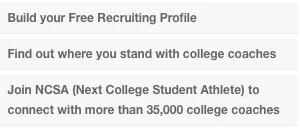Junior College Could Be a Great Option for High School Seniors

If you are a high school senior and you don’t know where you want to go to college—or you haven’t found an opportunity yet—attending junior college may be your best option. Similar to taking a postgraduate year, junior college gives students a chance to continue to build their athletic and academic profile before attending a school accredited by the NCAA.
Too Many Athletes Stop Playing Sports after College but Still Want To Be Recruited
Do not fall into this category. Athletes think that because they couldn’t find a school to attend, they can just take the next year off and an opportunity will appear. It is extremely difficult to get recruited to play at the NCAA Division I or Division II level even after taking just one year off from competing. Junior college allows you to continue to play sports, which looks much better to a college coach than taking a year off to play in the local rec league. The level of competition will likely be higher than the one you played at in high school, and taking that step may make you more appealing to a coach.
Know the Rules if You Want to Transfer
Transferring is not as easy as most people think. If you attend junior college because you were academically ineligible to compete at the NCAA level, you must complete your associate’s degree. If you do not receive your associate’s degree, the NCAA Eligibility Center will still consider your high school grades and standardized test scores. If you were an NCAA nonqualifier and transfer to an NCAA Division I or Division II institution, you may have to sit out a year of competition with no scholarship to become eligible. If you entered junior college as an NCAA qualifier, you can transfer sooner.
It May Be More Cost Effective
Most athletes think that athletic scholarships cover all of the costs associated with attending college. This is only true for several sports and for a small percentage of top-level athletes in other sports. Whether you are able to get a scholarship or if you pay out of your own pocket, the costs of going to junior college are usually less than many of the scholarship offers you may get as a high school senior. Coming out of junior college with two or three full years of eligibility left and a much mature athlete will help you receive a better scholarship to a four-year college.
Restrictions for International Athletes
Junior college has always been a great way for international athletes to gain exposure in the United States, and it still is; however, the National Junior College Athletic Association passed a law last year limiting the number of international athletic scholarships per team to just three. This means that international athletes can still compete, but the opportunities to have their expenses paid are much harder to obtain. Still, attending junior college is one of the most cost-effective methods for international athletes to get exposure in the United States.
How Do I Find Junior College Opportunities?
Looking for an opportunity to play at a junior college is similar to the process of finding an NCAA scholarship. First you have to research the schools that offer your sport. Then you must put together a profile highlighting your academic and athletic skills and achievements. Finally, you must reach out to coaches and contact them yourself; do not wait for them to contact you.
How do you think playing at a junior college may benefit an athlete? Let us know in the comment section below.
Are you contacting college coaches and not getting the responses you were hoping for? Ask us questions in the comments section below or on Facebook, Twitter, or Google+!


